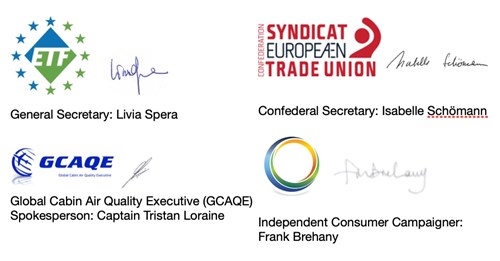Air quality on flights to improve if EU backs new expert standard
Joint Press Release
This blog post is tagged with:
Cabin Air Quality CEN European Standards Aviation European Union Pilots Cabin Crew Aerotoxic ETF ETUC GCAQE Aviation RegulationThis release is made by Frank Brehany (Air Passengers), the European Trade Union Representative Bodies, ETF & ETUC, and the Global Cabin Air Quality Executive (GCAQE)
Airline passengers and aircrew will enjoy safer air during flights if the EU accepts new safety standards drawn up by industry stakeholders.
The new draft standard on aircraft cabin air quality includes measures to prevent exposure to engine oil and hydraulic fumes onboard aircraft during commercial flights.
The standard would also benefit airlines by streamlining methods to investigate cabin air contamination events involving oil and hydraulic fluid and, in doing so, reducing costs.
The proposed standard is the product of five years of work by the European Committee on Standardisation (CEN) (1), made up of trade unions, passenger groups, manufacturers and airlines.
It is based on recommendations from European and international accident investigation agencies on how to prevent aircrew and passengers from becoming impaired from flying as a result of inhaling oil and hydraulic fumes.
The coalition is now calling on CEN groups to approve the final draft and on the EU Aviation Safety Agency (EASA) to make the standard binding (2).
The measures are needed to improve longstanding concerns around air quality on board aircraft as a result of the system used to maintain cabin pressure, ventilation and the climate control system.
On most planes, a “bleed-air” ventilation system is used to supply air to the cabin and flight deck. It means air is first compressed in either the engine or auxiliary power unit compressor, leading to low-level contamination of the air supply during routine flight. Less often, higher-level contamination with oil and hydraulic fluid can occur when the system is degraded through maintenance problems or failure conditions.
In a joint statement on the new standard, four stakeholders of the CEN working group, commented:
“This standard represents what can be accomplished when experts from every side of the cabin air issue collaborate within a structured and balanced framework”.
“We have valued the opportunity to work alongside our industry and standard-setting colleagues to develop this standard which, if implemented, will facilitate the supply of safer ventilation air to the passenger cabin and flight deck and, in doing so, will improve both the flight experience and flight safety.
“The document is approaching its final stage and we hope that it will be universally approved and adopted into the lexicon of aviation standards. We believe that the new standard provides a world-beating reference on how to manage the issue of contaminated air on aircraft and not only stands above current standards regulation, but that it will deliver continued stakeholder consultation, innovation, solutions and benefits for all.
“We call on the European Commission, the European Parliament and EASA, to formally recognise the value of the work carried out by a diverse range of Stakeholders, and to ultimately promote the benefits of the Standard to manufacturers, airlines, employees and passengers”.
Joint statement from:
ETF General Secretary: Livia Spera
ETUC Confederal Secretary: Isabelle Schömann
Global Cabin Air Quality Executive (GCAQE): Spokesperson: Captain Tristan Loraine
Independent Consumer Campaigner: Frank Brehany (www.frankbrehany.com)

Media Note:
- - The European Committee for Standardisation (CEN) brings together the national standardization bodies of 34 European countries.
- - European Aviation is regulated by EU Regulations and associated Standards. Regulation is described as ‘hard law’, in other words it must be complied with, whereas, current Aviation Standards are not legally binding. The principal ‘hard law’ device is EU Regulation 2018/1139; this regulates everything relating to Aviation, including the operation of EASA. This principle Regulation is supported by implementing Regulations. Regulation is supported by Aviation Standards. These Standards are made by EASA in Consultation principally with the Aviation Industry and are generally open to online Public Consultation through the EASA website.
The following are the current Standards that define methodology to support Regulation: Certification Standards (CS) (these are non-binding technical Standards); Acceptable Means of Compliance (AMC) (these are non-binding Standards, they are not legislative in nature and cannot create additional obligations on regulated parties – there is currently a presumption of compliance); Alternative Means of Compliance (AltMoC) (these are non-binding Standards but the regulated party loses the presumption of compliance and must prove compliance with Regulation).
Scenarios set out in current Aviation Standards tend to deal with ‘failure conditions’.
The proposed Standard discussed in this release extends beyond the current limitations found in Aviation Standards, thereby producing a Standard that is fit for purpose for the Aviation Industry and its users.
It should be noted that CS 25.831 (Amendment 23 - 2019) at 4) states: “4. Probable failure conditions. For probable failure conditions, the ventilation system should be designed to provide enough fresh air to prevent the accumulation of odours and pollutants such as carbon dioxide. Under these conditions, the supply of fresh air should not be less than 0.18 kg/min (0·4 lb/min) per person for any period exceeding five minutes. However, temporary reductions below this flow rate may be accepted, provided that the compartment environment can be maintained at a level which is not hazardous to the occupant; for this purpose, the applicant may refer to international cabin air quality standards”. (https://www.easa.europa.eu/sites/default/files/dfu/CS-25%20Amendment%2023.pdf - Page 2-D-103)
- - Please Note: A small number of spokespersons are available for comment. Please indicate your requirements to any of the following and further assistance will be provided:
Eoin Coates
ETF - Head of Aviation
mobile +44 7738 717988
e.coates@etf-europe.org
Captain Tristan Loraine
Spokesperson
Global Cabin Air Quality Executive (GCAQE)
44(0)7968213862
Frank Brehany
Independent Consumer Campaigner
www.frankbrehany.com
00441215460650
(UK & Europe)
